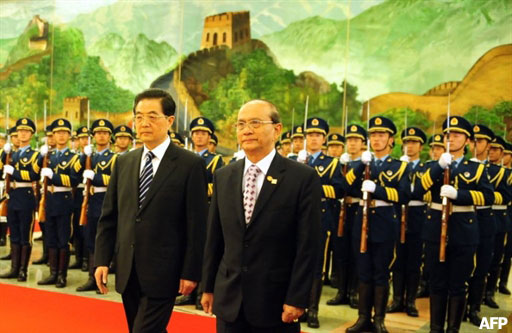(Commentary) – For years China’s behaviour toward Burma has been a matter of contentious debate. Opponents of the Burmese government routinely condemn China’s investments and trade in Burma as fueling human rights abuses and coating the pockets of Burma’s ruling circle in detriment to the prevailing situation through much of the country. And today, as Burmese President Thein Sein finishes his trip to China, a quick glance at Burmese blogs and news sources reveals no shortage of disdain for Chinese policy in supporting governments with less than stellar human rights records, along with cries that Beijing is treating Burma as something akin to a 21st century colony.

Nevertheless, Chinese policy, whether or not one agrees, is remarkably consistent. One item on the agenda of the Burmese and Chinese delegations was the subject of port privileges for Chinese naval vessels in Burmese harbours. Beijing is already actively involved in the development of similar port facilities throughout the Indian Ocean region, including in Pakistan and Sri Lanka. Moreover, in recent weeks the evolution of Chinese naval power drew Western attention in the wake of unrest in Libya, as China sent an unprecedented military fleet to the North African country to oversee the evacuation of Chinese interests.
Regarding energy resources, a subject linked with China’s growing interest in deep water port facilities throughout the Indian Ocean region, Beijing consistently targets energy rich but less developed and developing countries. Chinese overtures are in return routinely welcome, as Beijing can be relied upon not to pair trade and aid packages with worrisome human rights standards. The result is often China securing Chinese economic and energy interests and the partner country’s government accruing much needed financial and political clout in cementing power at home.
Yet, among the numerous troubled countries comprising the Indian Ocean’s periphery, it is difficult to identify a country presently more exposed to the dangers of Beijing’s aggressive foreign policy than Burma. Following Burma’s national elections last November and the subsequent convening of Parliament earlier this year, China became the first country to welcome in the new government by sending a top-level political envoy. However, while Burmese ports and resources are always going to draw Chinese attention, the ongoing deep divide within the Burmese polity allows Beijing the upper hand in pushing deals through.
|
As it stands, while ominous warnings of Burma evolving into a de facto colony of China are greatly overstated, Beijing will be happy to continue to exploit a fractured Burma, dictating terms and conditions of bilateral arrangements. |
On the part of the newly inaugurated government of President Thein Sein, there appears to be recognition of the pivotal and prominent role of China. The president arrived in China on Thursday, making the giant neighbour his first bilateral state visit. And given China’s size and influence, especially regionally, it will always feature prominently in Burmese foreign policy, regardless of Burmese political systems and leadership. Yet, the Naypyitaw-Beijing relationship is not necessarily a happy one. The present leadership in Naypyitaw is no keener to be judged as kowtowing to Chinese interests than Burmese governments and royal courts throughout the centuries.
So, why does Burma play the little brother role with respect to China? Simply put, it has to. China inked deals for more than US$ 12 billion in foreign direct investment in Burma in 2010 alone, a massive sum for the recipient country whose government is estimated to bring in annual revenue of US$ 1.3 billion. And the blame for the present gross discrepancy in political capital rests squarely on the shoulders of Burmese leadership, as protracted political rifts permit Beijing to deal with Naypyitaw from an automatic point of accentuated strength in aggressively promoting broader foreign policy objectives.
The Burmese government, which remains heavily influenced by the country’s military leaders, continues to place skewed domestic security assessments ahead of international security concerns beyond pure military posturing. While the Tatmadaw, the Burmese military, has for the past two decades sought to assertively address perceived gaps in military capacity vis-à-vis neighbouring states, other aspects of international security have been allowed to wane. National security cannot be solely a function of military projection. Rather, it must also incorporate such factors as social, economic and human security.
However, the imbalance in Sino-Burmese relations is not only attributable to decision-making on the part of Burma’s military and current civilian-fronted government. Isolationist policies on the part of Burma’s political opposition, in turn reflected in the foreign policies of a number of countries, are also to be held accountable. Proactive engagement of domestic and international actors commonly identified as hostile to opposition interests should be promoted, with a commitment beyond dialogue aimed at ideological reconciliation brought to the fore.
Though it is encouraging to read of opposition leader Aung San Suu Kyi’s support for the newly enacted position of a United States special envoy to Burma, there needs to be a corresponding push from the Nobel laureate and her party to approach Burma’s power brokers in a similarly less than morally ideal light; but a light, nevertheless, supporting long-term opposition goals.
As it stands, while ominous warnings of Burma evolving into a de facto colony of China are greatly overstated, Beijing will be happy to continue to exploit a fractured Burma, dictating terms and conditions of bilateral arrangements. The sooner Burma opens up to international development, implements the rule of law, creates a functioning banking system, and makes loans more easily available to citizens to expand the stagnant economy, the less the government will be dependent on China as its major source of funding.
Burma, in short, needs to take the lead in getting its own house in order. Until then, Beijing will exploit the relationship in a manner consistent with the assessed interests of China and her citizens. And those interests patently do not include the rights of Burma’s citizenry. That is an issue for Burmese leadership–both government and opposition–to take the lead on, both collectively and creatively.


